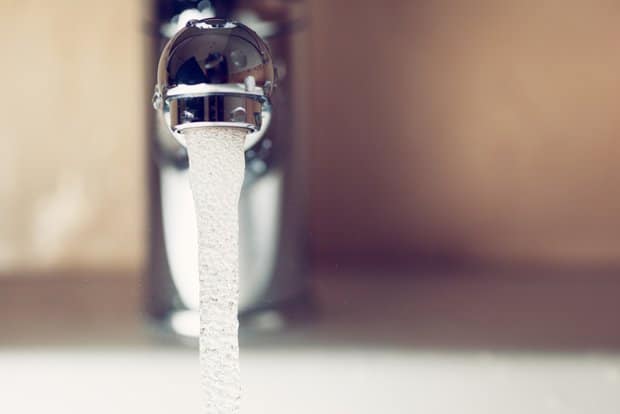
It looks so innocent and clear coming out of the faucet, but it turns out that regular old tap water may actually damage your skin.
At the very least, it can derail your anti-aging efforts.
That doesn’t mean you have to invest hundreds in bottles of distilled water to wash in. There are actually easy ways to reduce the damage, while nourishing your skin at the same time.
5 Ways Tap Water Causes Harm
As you may have already guessed, it’s not the water itself that may be causing the damage, but what’s in it.
- Chromium VI: In a previous post, I noted that the Environmental Working Group (EWG) had found measurable levels of chromium VI in the tap water of 31 out of 34 cities sampled. In addition to being a carcinogen, chromium VI is a skin irritant, and can cause contact dermatitis and allergic reactions.
- Heavy metals: Tap water contains heavy metals like iron, copper, magnesium, and zinc. Though they are present at very small levels, they can interact with free radicals and damage collagen fibers in the skin. They can also cause a reaction with the skin’s natural oils, clogging pores.
- Minerals: Most American homes have hard water, which is full of minerals. If you don’t have a water softener in your home, you’ve likely seen the hard water stains on your shower door or curtain-those white, chalky marks. That same water can leave a soapy layer on the skin that clogs pores, increasing acne breakouts, while leaving skin itchy and dry. With repeated use, hard water can also increase risk of redness and eczema. A 2014 study, for example, found that infants living in areas with high calcium content in the water supply (hard water) were at an increased risk for eczema. Researchers also found that those living in hard-water areas were at a greater risk for damage to the skin barrier, resulting in dryness.
- Chlorine: According to the Environmental Protection Agency (EPA), to protect water from disease-causing organisms, water suppliers often add a disinfectant, like chlorine. Unfortunately, chlorine is bad for your skin (and your hair). It’s an irritant, and because of its abrasiveness, can cause itchiness and even rashes. It strips the skin of its natural oils and damages the outer layer, leading to increased dryness and flakiness. Over time, it can exacerbate the appearance of fine lines and wrinkles, accelerating the aging process.
- Fluoride: Fluoride is also added to drinking water to “protect public health” as the EPA says-mainly, to promote dental health. Like chlorine, it’s irritating to skin, but it can also disrupt the production of collagen, which can have aging effects.
How to Reduce the Damage and Protect Your Skin
To reduce the damage your water may be doing to your skin, try the following steps:
- Get a water softener: If you have hard water, a softener will help reduce the mineral content, which can alleviate that dry, tight feeling.
- Get a water filter: These help filter out heavy metals and other impurities in your tap water. Read more in our previous post on getting a shower filter.
- Use a non-alcoholic toner: After cleansing your face, use a gentle, non-alcoholic toner, which helps remove traces of soap, minerals, heavy metals, and other contaminants from the skin before you apply your moisturizer. Note: our Rescue + Relief Spray works great for this!
- Make sure you’re getting enough antioxidants: Vitamin C and E, green tea, turmeric, rose hips, CoQ-10, and other similar skin care ingredients act as antioxidants, helping to counteract any free radical activity that your tap water may cause. Eating antioxidants also helps-more tea, fruits and veggies!
- Try no-rinse cleansing waters: Organic cleansing waters work without having to use tap water. The good ones cleanse and moisturize at the same time. You can also use cleansing milk followed by a good toner.
- Use a gentle cleanser: There is some evidence that harsh sulfates in most cleansers may react with metals and minerals in tap water to further damage your skin. Make sure you’re choosing sulfate-free, gentle cleansers that don’t make it worse.
- Treat your skin immediately after washing: Whether you bathe, shower, or just wash your face in the sink, always treat it with toner and a moisturizer immediately afterwards. This raises the odds that you’ll get rid of any remaining impurities and will prevent damage and dryness.
- Use distilled water: This may seem a bit extreme, but if you have really sensitive skin and you can’t get rid of acne, redness, or dryness no matter how hard you try, you may want to consider rinsing with distilled water just to see if it helps.
Have you noticed that tap water can damage your skin? Please share your thoughts.
Sources
“Chromium Toxicity,” Agency for Toxic Substances and Disease Registry, CDC, December 18, 2008, http://www.atsdr.cdc.gov/csem/csem.asp?csem=10&po=10.
Chaitali V. Mohod, Jayashree Dhote, “Review of Heavy Metals in Drinking Water and Their Effect on Human Health,” International Journal of Innovative Research in Science, Engineering and Technology, July 2013; 2(7):2922-2996, http://www.researchgate.net/publication/251237189_REVIEW_OF_HEAVY_METALS_IN_DRINKING_WATER_AND_THEIR_EFFECT_ON_HUMAN_HEALTH.
Bruce Jancin, “Hard water linked to infant eczema,” Dermatology News, October 17, 2014, http://www.edermatologynews.com/specialty-focus/atopic-dermatitis/single-article-page/hard-water-linked-to-infant-eczema.
“Basic Information About Disinfectants in Drinking Water: Chloramine, Chlorine, and Chlorine Dioxide,” EPA, http://water.epa.gov/drink/contaminants/basicinformation/disinfectants.cfm.

